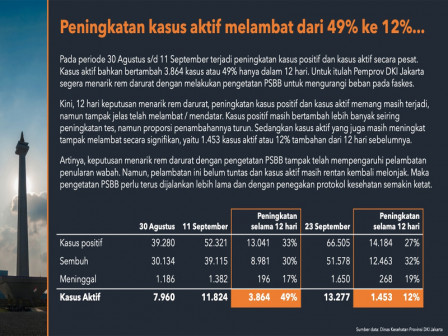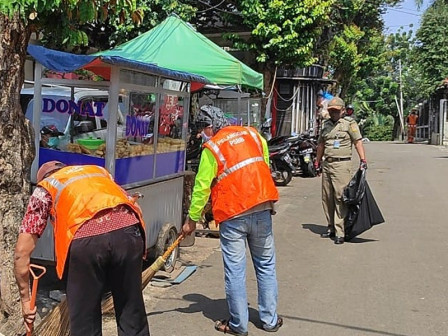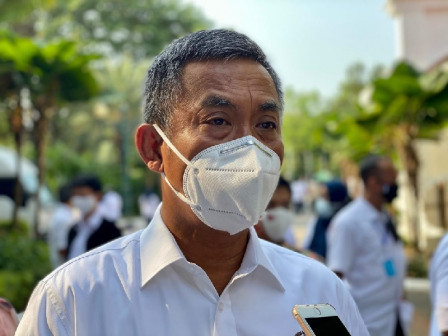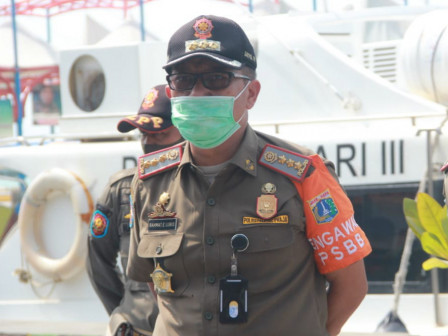Jakarta Back Under PSBB, Orders People to Be More Disciplined
Reported by Rezki Apriliya Iskandar | Translated by Nugroho Adibrata
He also agreed to the automatic extension of the PSBB for two weeks
Jakarta Provincial Government has once again reimposed the large-scale social restrictions (PSBB) policy amid a rising number of confirmed COVID-19 cases in the capital.
It is based on the results of monitoring and evaluation of the COVID-19 Handling Task Force and also stated in Governor Decree number 959/2020, which requires an extension of restrictions for the next 14 days if cases have not decreased significantly.
Jakarta Launches PSBB OK ProgramJakarta Governor Anies Baswedan delivered that the administration continuously coordinated with the central government in handling the disease.
"In the coordination meeting related to anticipating the COVID-19 case in Greater Jakarta, the Maritime and Investment Ministry (Marives) shows data that Jakarta is sloping and under control but the Bodetabek area is still increasing so it needs alignment of policy steps. He also agreed to the automatic extension of the PSBB for two weeks," he expressed, as quoted by Jakarta PPID's press release, Thursday (9/24).
He then explained there were now signs of lowering positive cases and active cases in Jakarta along with reduced mobility of residents during the tightening of the PSBB.
On the first 12 days of September, the case increased by 49% or 3,864 cases. During the PSBB, which was 12 days later, there were an increase in active cases but decreased to 12% or 1,453 cases.
"Streamlining the active cases chart is not the end goal. We still have to continue working together to break the chain of transmission. The government continues to increase the 3T and residents need to be at home first except to go out for urgent and remain implement 3M," he stressed.
As fo the information, the number of positive cases increased slightly more than before as the number of tests increased. However, the number of cured cases has also increased rapidly.
"The number of active cases is still haunting us and needs attention, especially regarding the capacity of health facilities. What also needs to be of particular concern is the mortality rate which continues to increase, despite it shows early signs of sloping where the mortality rate is currently 2.5%," he added.
He furthered that the increase in daily cases since the tightening of PSBB was shown in the case onset graph (adjusted for the date of transmission) and also the Rt value or virus reproduction.
In early September, Jakarta's Rt value was 1.14 and currently was reduced to 1.10, which meant 100 people had the potential to transmit the virus to 110 other people. Hence, transmission should be continuously suppressed until the Rt value below 1.00.
"People activity clearly has an effect on increasing virus transmission. The higher the population movement will trigger the virus transmission. The decline that has recently begun to appear is also in line with the increase in the number of residents who stay at home. The FKM UI team calculated that a minimum of 60% of the population was needed to stay at home thus the transmission of the plague raged and began to decrease. Currently, around 50% of the population is still at home," he continued.
Despite it had shown early signs of a slowdown, he emphasized that the increase in cases should be suppressed. Without strict restrictions and with fixed testing rates as of now, the number of daily cases in Jakarta was predicted to reach 2,000 per day by mid-October, while active cases would hit 20,000 by early November.
As for information, the number of people tested in Jakarta continues to increase as the testing capacity increases. As of September 23, 857,863 people or 80,588 people per million populations have undergone swab tests. The test capacity in Jakarta per week is more than 6 times of the WHO standard, in which WHO sets the ideal number of tests for each region of 1 person per 1,000 population per week.
As capacity increases, the level of use of isolation rooms and special ICUs for COVID can be maintained, despite active cases has also increased. Usability levels need to be reduced to <60% according to WHO recommendations. From the number of isolation beds reaching 4,812, until September 23, the percentage of use is 81%
The administration has worked with central hospitals, army/police, BUMN and private companies to increase bed capacity. However, efforts to suppress the increase in active cases also need to be continued in a bid to catch up with the capacity of health facilities. That is why the PSBB must be extended for two weeks to minimize the cases significantly.





